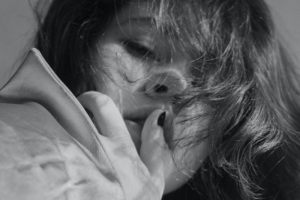Are we too embarrassed to be depressed?
Depressed but Not Embarrassed: Unmasking the Hidden Struggles

2 min read
Photo by LML 6768
Breaking the Silence: The Hidden Struggles of Depression and the Weight of Embarrassment
As a burnt-out mom juggling life’s endless demands, I’ve had my fair share of tough days. There were moments when I felt overwhelmed, trapped in a cycle of exhaustion and sadness. But here’s a secret I’ve held onto for far too long – I was embarrassed to admit that I might be depressed.
“Each person must discover for themselves where their own pain threshold for stress lies – and ideally, stay below it.”
– Nora Tschirner
Recent headlines about actor Nora Tschirner’s courageous confession have shed light on an issue that plagues countless individuals around the world: the stigma surrounding depression. It’s time we break the silence and explore why so many of us keep our mental health battles a closely guarded secret.
The Hidden Epidemic
Depression isn’t a rare or uncommon experience. In fact, it’s one of the most prevalent mental health conditions globally.
According to the World Health Organization (WHO), over 264 million people of all ages suffer from depression. That’s nearly 3.5% of the world’s population.
The Fear of Judgment
So, why do we hesitate to open up about our struggles with depression? Much of it boils down to fear. Fear of judgment, fear of being labeled, and even fear of losing our sense of self-worth. We worry about how others will perceive us, afraid that they might think we’re “weak” or “broken.”
Nora Tschirner’s story is a stark reminder of this stigma. In her confession, she admitted to feeling embarrassed about her depression, a sentiment shared by many. But why should we be ashamed of something that affects millions worldwide? It’s high time we dismantle this harmful notion.
Heavy Secrecy
Keeping depression under wraps has consequences beyond our emotional well-being. It can lead to a spiraling decline in our mental health, making it even more challenging to recover. The longer we hide our pain, the heavier the burden becomes.
The Invisible Weight
Depression, often referred to as the “invisible weight,” can manifest in various ways that might not be immediately noticeable to those around us. It’s essential to remember that depression isn’t a one-size-fits-all condition; its presentation can be as unique as the individuals it affects. While some may experience overwhelming sadness and tears, others might appear emotionally numb or irritable. Physical symptoms can include changes in appetite, sleep disturbances, and unexplained aches and pains. Depression’s complexity lies in its ability to hide in plain sight, often behind a smile or a facade of normalcy. Understanding that depression can wear many masks is the first step in recognizing and addressing it in ourselves and others.
Common symptoms of depression
- Persistent Sadness: Feelings of deep sadness, emptiness, or hopelessness that last for an extended period.
- Loss of Interest: A diminished interest or pleasure in activities or hobbies that were once enjoyable.
- Fatigue: A constant feeling of tiredness, even after getting adequate rest.
- Sleep Disturbances: Experiencing difficulties falling asleep or staying asleep, or oversleeping.
- Changes in Appetite: Significant weight loss or gain due to changes in appetite.
- Irritability: Feeling easily agitated, short-tempered, or experiencing mood swings.
- Physical Symptoms: Unexplained physical complaints like headaches, stomachaches, or general aches and pains.
- Difficulty Concentrating: Struggling to focus, make decisions, or remember things.
- Feelings of Guilt or Worthlessness: Persistent self-blame or a sense of being worthless.
- Isolation: Withdrawing from social activities and avoiding friends or family.
- Loss of Energy: A pervasive sense of fatigue or lack of physical and mental energy.
- Thoughts of Death or Suicide: Frequent thoughts about death, dying, or harming oneself.
These symptoms can manifest differently from person to person, emphasizing the importance of recognizing depression’s many faces and seeking support when needed.
Depression and Libido
One aspect often affected by this mental health condition is libido, or your sexual drive. When you’re grappling with depression, it’s common to experience changes in your sexual appetite and function.
Depression can bring about a range of physical and emotional symptoms, such as fatigue, changes in appetite, and a persistent sense of sadness. These symptoms can collectively contribute to a decreased interest in sex. Additionally, the emotional toll of depression can make it challenging to connect with your partner or even feel desirable.
The hormonal shifts that accompany depression can further impact libido. Stress hormones like cortisol tend to be elevated in individuals with depression, and these hormonal imbalances can disrupt the delicate interplay of chemicals in the brain that regulate sexual desire.
It’s essential to remember that experiencing changes in libido due to depression is entirely normal. Recognizing this connection can help you navigate these shifts in your sexual life with greater understanding and compassion. Seeking professional support, talking openly with your partner, and exploring coping strategies can be steps toward regaining a healthy and fulfilling sexual connection, even in the face of depression.
Breaking the Silence
It’s crucial to understand that depression is not a personal failing but a legitimate health condition. We must shatter the stigma and encourage open conversations about mental health. So, how can we break the silence and support those around us?
1. Seek Professional Help
First and foremost, reach out to a mental health professional. They are trained to provide guidance, support, and evidence-based treatments that can help you on your path to recovery.
2. Share with Trusted Friends and Family
Open up to trusted friends and family members who can offer emotional support. Sharing your feelings can be incredibly liberating and make you realize you’re not alone.
3. Educate Yourself
Take the time to educate yourself and those around you about depression. The more we understand this condition, the better equipped we are to support one another.
4. Break the Stigma
Challenge the stigma associated with depression whenever you encounter it. Your voice can be a powerful tool for change.
5. Be Kind to Yourself
Lastly, remember to be kind to yourself.
Depression is not a sign of weakness. It’s a testament to your strength in battling a challenging condition.
Let’s honor Nora Tschirner’s courage by turning her story into an inspiration for change. Together, we can create a world where no one feels embarrassed about being depressed, and everyone can seek the help they deserve.
It’s time to unmask our struggles, shed the stigma, and embrace the path to healing. Depression may be part of our journey, but it doesn’t define us.
Here is an article (German) about Nora Tschirner to #endthestigma
Read more about being enough here.
Click on the button to load the content from open.spotify.com.
DID WE TOUCH A NERVE? SHARE THIS WITH YOUR FRIENDS (OR ENEMIES!) AND COMMENT BELOW!
© 2024 pleasepinchmehard. All rights reserved.






